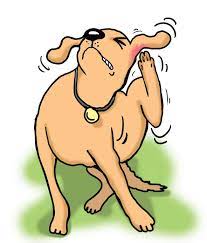It has truly been a hot summer season in the US and hopefully beginning to ease up a bit in many parts of the country with cooler nights and slightly more normal average temps. We still need to remain vigilant and sensitive to how the temperatures affect our furry family.
Our canine companions can still face various seasonal health challenges. Late summer can still be an uncomfortable time for dogs including discomfort of hot spots to the danger of paw pad burns. Here are some late summer issues every dog owner should be concerned about:
- Acute Moist Dermatitis (aka Hot Spots), while owners may not notice changes as quickly, dog groomers often see hot spots in summer. These are inflamed, infected patches of skin that can develop rapidly and can become quite infected. Hot spots often occur after getting wet. For example after a swim, incomplete drying after a bath, or even after rainstorms, as moisture gets trapped against a dog’s skin during humid days. They can also pop up quickly and become noticed in itchy dogs who repeatedly chew and lick the same areas. Frequent checking of your dog’s paws, throat, or base of their tail. These are areas where hot spots commonly develop.
- Bites from fleas, ticks, and mosquitoes: Parasites are more active in warm months, and infestations are common. These itchy bites can lead to allergic reactions, skin irritation, and infections from scratching. While keeping your pet on parasite prevention is crucial, if your pup does get parasites, a soothing bath is just as important to remove the parasites and soothe any skin irritation.
- Heat rash: Just as uncomfortable for a dog as it is for humans, heat rash can be raw, sore, itchy, and painful—and the cause of secondary infections. It’s caused in areas where there’s poor ventilation and/or skin folds, such as a dog’s armpit.
- Allergic dermatitis: Dogs can have seasonal allergies just like people. Ragweed, grasses, and weed pollens are common canine allergens, as are mold spores, dust mites, and gardening chemicals. If your pup is scratching or constantly rubbing its face, consider a visit to the groomers for a soothing hypoallergenic bath as well as topical treatments. Some dogs also benefit from air purifiers, added dietary Omega-3s, and even wiping paws after being outdoors. And, don’t forget dogs need extra hydration during hot weather, just as we do.
As always it is wise to consult a veterinarian if you have any questions or concerns. Some pets with severe allergic dermatitis may need support from their veterinarian to get them through these tough summer months.
[Source]
